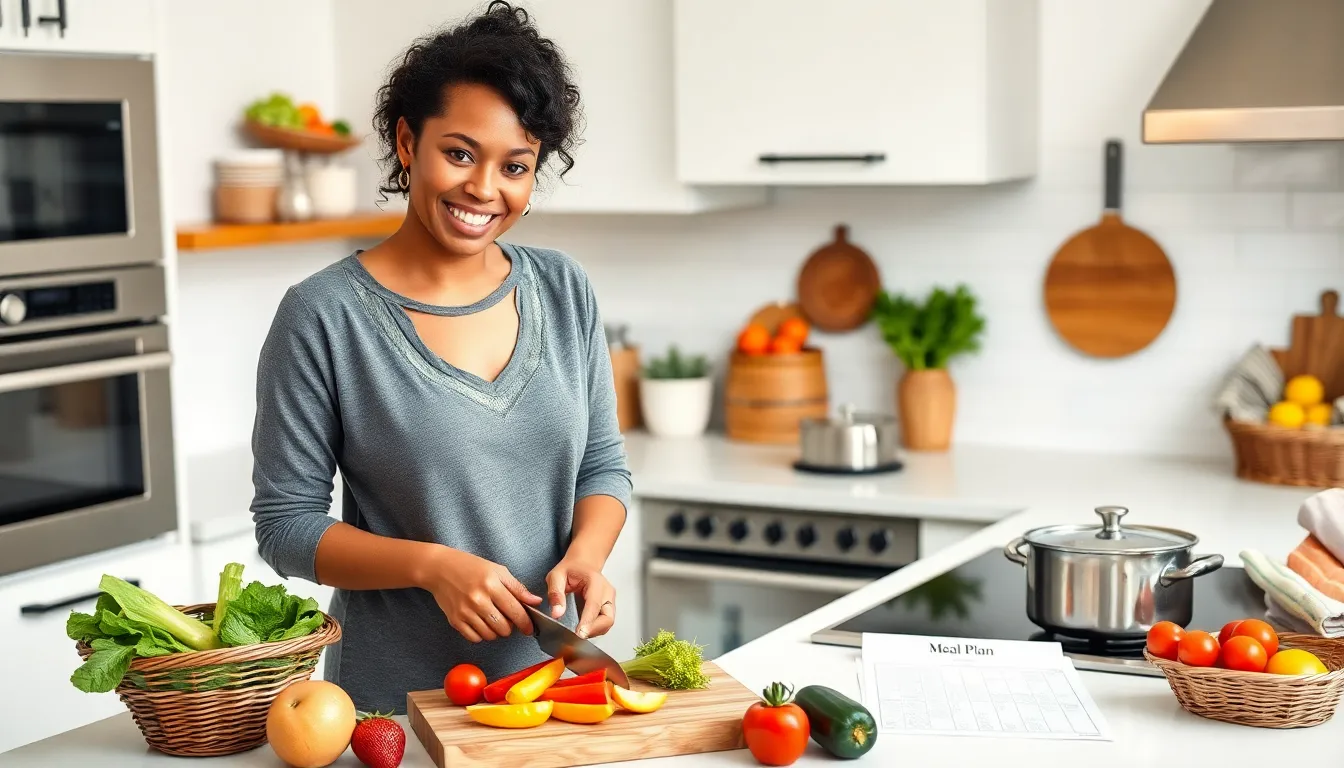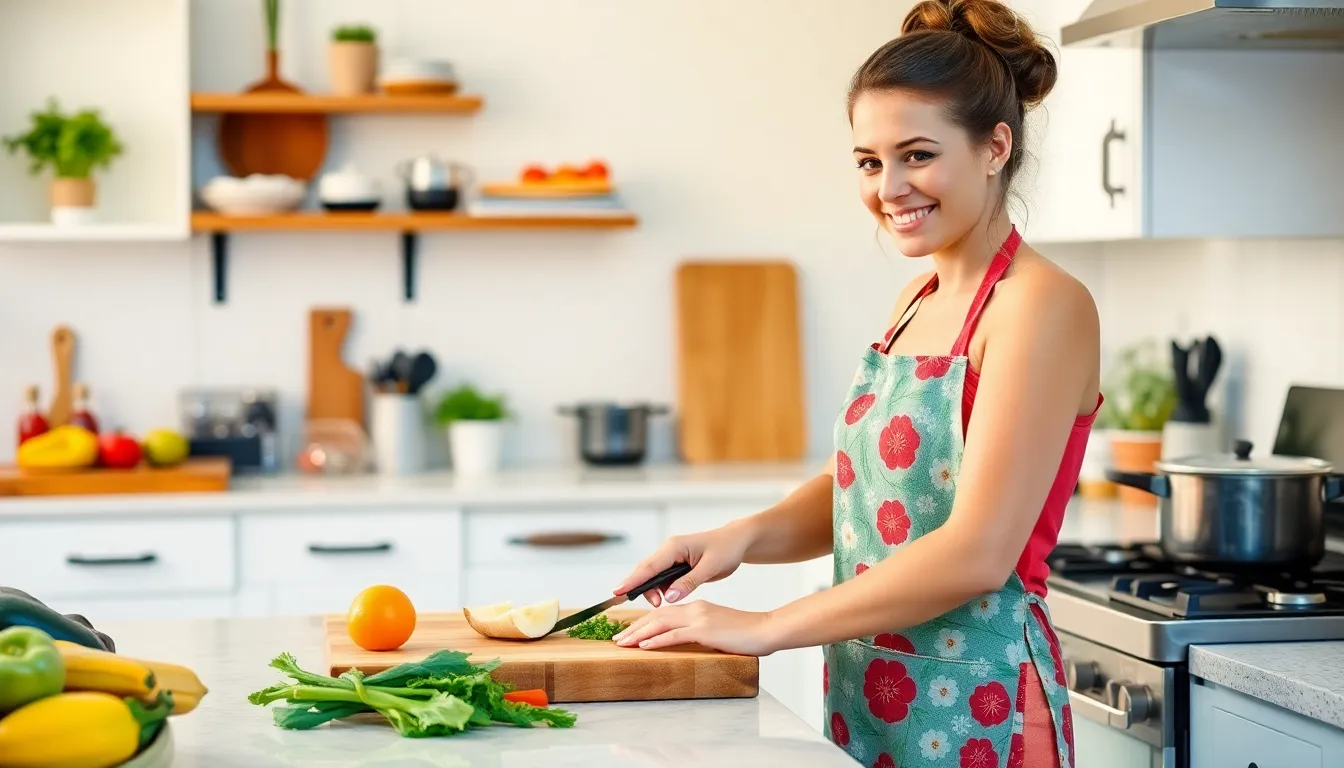In the whirlwind of daily life, the kitchen often becomes a battleground where chaos reigns supreme. Juggling meal prep, cooking, and cleaning can feel like a high-stakes game of Tetris, with ingredients and utensils flying in every direction. But what if there was a way to turn that chaos into a well-orchestrated symphony? Kitchen time management is the secret ingredient that can transform even the most disorganized home cook into a culinary maestro.
Imagine slicing your cooking time in half while still serving up delicious meals that impress your family and friends. With a sprinkle of planning and a dash of strategy, anyone can master the art of kitchen efficiency. It’s not just about saving time; it’s about reclaiming those precious moments to enjoy life outside the kitchen. So, let’s dive into the world of kitchen time management and discover how to cook smarter, not harder.
Table of Contents
ToggleUnderstanding Kitchen Time Management
Kitchen time management optimizes cooking and cleaning tasks, turning chaos into order. This process transforms how individuals approach meal preparation, enhancing efficiency and enjoyment.
Importance of Effective Time Management
Effective time management streamlines kitchen tasks, leading to shorter cooking times. Prioritizing this skill frees up time for family and leisure activities. Cooks who manage their time well often report reduced stress and improved meal quality. Food preparation becomes less daunting, allowing cooks to explore new recipes without feeling overwhelmed. Efficiency gained through time management encourages organized surroundings and fosters a better cooking environment.
Benefits of Good Time Management in the Kitchen
Good time management in the kitchen provides numerous advantages. It reduces food waste by ensuring all ingredients are used timely. Efficient planning allows cooks to prepare meals that are both nutritious and delicious. Budgeting time carefully cuts down on last-minute takeout decisions, leading to healthier eating options. This efficiency further supports meal planning for the week, enabling better nutritional choices while reducing grocery shopping trips. Ultimately, effective time management elevates the joy of cooking, making it a more pleasant experience overall.
Essential Kitchen Time Management Techniques

Efficiency in the kitchen relies heavily on effective time management techniques. Implementing structured strategies transforms meal preparation into a more manageable task.
Planning Meals in Advance
Planning meals in advance reduces decision fatigue and streamlines grocery shopping. Committing to a weekly menu simplifies the cooking process, making it easier to keep track of ingredients. Utilizing seasonal produce allows individuals to enjoy fresher flavors while potentially lowering costs. Creating a shopping list based on planned meals minimizes food waste and ensures nothing gets forgotten. Meal prepping, such as chopping vegetables and marinating proteins ahead of time, saves time on busy weeknights.
Creating a Daily Routine
Establishing a daily routine fosters consistency in kitchen tasks. Designating specific days for grocery shopping and meal prep enhances organization. Incorporating time slots for cleaning during cooking sessions prevents clutter from accumulating. Setting timers for cooking tasks encourages focus and prevents distractions. Adjusting cooking techniques, like using one-pot recipes, simplifies preparation and reduces cleanup. Developing this structured approach leads to smoother, more enjoyable cooking experiences.
Organizing Your Kitchen for Efficiency
Efficient kitchen organization plays a crucial role in effective time management. By arranging tools and ingredients strategically, cooks can reduce preparation time and enhance workflow.
Essential Tools and Gadgets
Cookware significantly contributes to a streamlined cooking process. Utilize sharp knives and a quality cutting board for quick ingredient prep. Invest in measuring cups and spoons for accurate ingredient portions. Incorporate good-quality pots and pans to improve cooking efficiency and heat distribution. Consider a food processor for chopping, slicing, and mixing tasks that can save valuable minutes. Finally, a reliable slow cooker or pressure cooker can simplify meal preparation and expand recipe options.
Decluttering Your Workspace
A clutter-free workspace fosters focus and speed. Clear counters of unnecessary items and group similar tools together for easy access. Organize utensils into designated containers or drawers, ensuring immediate retrieval during cooking. Regularly empty the trash and recycling to avoid distractions. Arrange pantry items by frequency of use, placing commonly used products at the front. Incorporate an approach to store leftovers in labeled containers, making it simpler to find meals later. Prioritize maintaining a clean and organized environment to support efficient kitchen time management.
Time-Saving Cooking Strategies
Effective cooking strategies streamline tasks and significantly cut down on time spent in the kitchen. Implementing a few simple methods makes meal preparation more efficient.
Batch Cooking and Meal Prepping
Batch cooking and meal prepping save time while ensuring healthy meals. Cooks can prepare large quantities of foods such as grains, proteins, and vegetables in one session. Using this approach, individuals can portion meals into containers for quick access throughout the week. Focus on versatile recipes that allow for easy reheating and repurposing. Consider cooking meals that freeze well, such as soups and stews, which enhance flavor and nutrient retention. This method minimizes decisions during busy weekdays and reduces waste.
Utilizing Leftovers
Utilizing leftovers is an effective way to maximize resources and minimize food waste. Cooks can creatively transform yesterday’s dinner into today’s lunch. For example, roasted chicken might become a vibrant salad or a flavorful wrap. Finding new recipes that incorporate leftover ingredients keeps meals interesting and reduces the effort needed for daily cooking. Packaging leftovers in clear containers helps maintain visibility and encourages their use. Planning meals around these remnants allows cooks to create satisfying dishes while efficiently managing time and resources.
Leveraging Technology for Better Time Management
Technology plays a crucial role in enhancing kitchen time management. Various apps and gadgets streamline tasks, making meal preparation quicker and more enjoyable.
Kitchen Apps and Tools
Numerous kitchen apps streamline meal planning and grocery shopping. Popular options include Mealime and Paprika, which help users organize recipes and create shopping lists. Apps like AnyList simplify collaborative grocery shopping, allowing users to share lists in real-time. Additionally, recipe apps often provide cooking timers and portion calculators, reducing prep time. Utilizing these digital tools can significantly declutter decision-making around meals, ensuring cooks focus on preparation and enjoyment.
Smart Gadgets and Appliances
Smart gadgets transform how individuals cook and manage time in the kitchen. Instant Pots enable one-pot meals that drastically cut down cooking time while maximizing flavor. Air fryers offer healthier alternatives for crispy dishes in less time. Connected appliances, like smart ovens, allow users to preheat remotely and receive alerts when meals are ready. Incorporating these innovative tools can lead to a more efficient cooking experience, lessening stress and promoting culinary exploration.
Mastering kitchen time management can transform the cooking experience from chaotic to enjoyable. By implementing structured strategies and utilizing technology, cooks can streamline their workflows and enhance meal preparation. This not only reduces stress but also opens up time for family and leisure activities.
Emphasizing organization and efficient techniques leads to better meal quality and less food waste. As cooks embrace these practices, they’ll discover the joy of exploring new recipes and savoring delicious meals without the overwhelming pressure. A well-managed kitchen fosters creativity and satisfaction, making every cooking session a rewarding experience.



